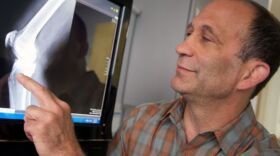Many of us have suffered from knee pain at some point in our lives. Because knees are such a common source of pain, many people could be helped by becoming more familiar with the joint and its injury types.
This week on “Take Care,” Dr. Gregory Martin gives an overview of the knee and the best ways to deal with knee pain. Martin is a board-certified, Harvard fellowship-trained orthopedic surgeon and author of the book “Education4Knees: Everything you Need to Know for Happy, Healthy, and Pain-Free Knees.”
Click 'Read More' to hear our interview with Dr. Martin.
While the knee may seem like a simple hinge-like joint, Gregory says “it is the most complex and largest joint in our body.”
Because the knee has so many muscles, ligaments, tendons, and cartilage, it is very susceptible to injury.
“Almost one out of every two people will develop symptomatic knee arthritis at some point in their lifetime,” Gregory says.
Your weight can also significantly affect your knee’s health. The more you weigh, the more pressure you put on your knee.
“Just with normal daily activity, the knee sees about four times the weight of the body,” Gregory says.
Obesity is one of many causes of knee pain. Gregory says some of the more common conditions include osteoarthritis, meniscal tears, and tendon and ligament damage.
For treatment of knee pain, Gregory advises that his patients take a holistic approach that does not focus solely on the knee.
“It’s more important to look at the whole person and what can the person do to optimize their condition despite what’s going on inside the knee.”
In order to effectively treat the knee, Gregory recommends what he calls the lifestyle approach. The four-part approach includes education, diet, activity, and support. Having knowledge of the knee and how it works is very helpful with rehabilitation and recovery.
Gregory also says that surgery should only be used as a last resort after other treatment options have been employed.
Instead, Gregory believes, diet and exercise are essential for maintaining an overall healthy body and mind, including joints like knees. While support from family and friends is often necessary with long-term recovery situations. He also encourages the use of pain medication and knee supports.
“There’s nothing wrong with things that temporarily make you feel better as long as they allow you to do the things that you want to do.”







